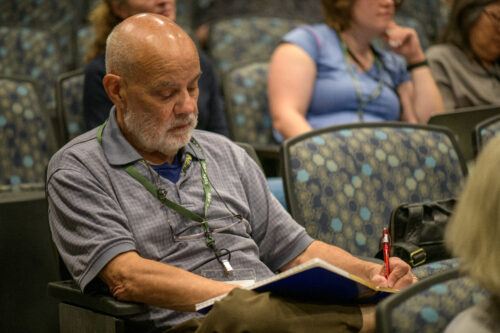How to Write Faster From a Very Slow Writer

The answer to how to write faster starts with making a game plan, eliminating distractions, and finding a ritual that works for you.
By Jamie Li (W ’25)
April 30th, 2025
I am a slow writer.
Like, a really slow writer. It can take me about an hour (sometimes more) to write a single paragraph. If the average paragraph is 250 words, it should take 50 minutes to write (according to wordcounter.net), which puts me squarely in the tortoise camp.
I suspect many people consider themselves slow writers. Or at least, wished they wrote faster. Probably because we always hear about the most prolific writers, like Stephen King, who has authored more than sixty books. Whatever you do, don’t compare yourself to Stephen King. Or anyone else for that matter. What matters most is that you’re showing up to hone your craft, no matter what the outcome looks like.
If you also identify as a slow writer, here are some tricks I’ve picked up in my practice to help you rev up your words per minute, or WPM:
- Arrive at the page with a game plan
- Eliminate any and all distractions
- Get in the zone with a writing ritual
- Make it fun, make it trash, make it anyway
Arrive at the page with a game plan
Nothing taunts me quite like a blank page. Each pulse of my cursor is a reminder of the seconds and minutes marching by as I stare into the page’s milky expanse. To combat my page paralysis, it helps to set an intention for what you want to get out of the writing session before diving in. Perhaps it’s finishing a couple pages of dialogue or patching up a plot hole.
After I finish a writing session, I often jot notes of what I want to accomplish in my next one so that I can hit the ground running. If I haven’t left this note for myself, my outline provides handy guideposts so I know where I should generally end up as I write.
The important thing is to give your future self a place to start, so the blank page doesn’t feel so intimidating.
Before you even arrive at the page, you should also have a game plan to protect the time and space you’ve carved out for yourself to make the most of your writing sessions—bonus points for sticking to a consistent routine, like writing at the same time and place.
Prepare all your requisite snacks and beverages ahead of time and then give everyone in your immediate vicinity a heads up that you are entering sacred writing time and to not distract you. As an extra accountability boost, you might (virtually) co-work with a friend or have someone text you at the end for your word count progress.

You don’t have to change who you are to learn how to write faster. At VCFA, students learn tools to become better and more efficient writers.
Eliminate any and all distractions
Our phones and laptops are portals into an entire world of digital distractions that exist to siphon away all of your productivity and good intentions.
Nothing is more destructive to a writing practice than getting distracted.
When James Baldwin said, “The challenge is in the moment; the time is always now,” he may not have been referring to distractions, but we would do well heeding his words. He did, after all, write nine novels, countless essays and short stories, and several plays.
Research shows it takes an average of 23 minutes to regain focus after a distraction because different parts of your brain are activated every time you switch between tasks.
Make sure you’re turning on Do Not Disturb on all your devices whenever you sit down to write. Better yet, turn off your phone and put it in the other room.
If you need more hardcore solutions, try software that blocks you from using websites or apps for certain periods of time (free programs in italics):
Try those in tandem with these distraction-free writing programs:
- Scrivener
- Cold Turkey Writer
- Notion
- FocusWriter
- Or go analogue with pen and paper
You can also try out the Pomodoro method, which encourages short sprints of focused work interspersed with breaks.
No matter how well I’ve wrangled my devices or my spaces, sometimes distractions can come from the environment around me. Nagging piles of clutter on my desk will remind me that I’m overdue to tidy up. Seeing the overflowing laundry hamper nearby fills me with a sense of dread.
When I sense my thoughts lingering on the dozens of disparate tasks awaiting my attention, I know it’s time for a change of scenery.
Changing locations helps you refresh your state of mind and release any mental baggage that may be interfering with your process.
Try writing at:
- the library
- a hotel lobby
- a cafe
- your car
- a friend’s home
If you’re stuck at home and all else fails, don’t underestimate the power of noise-canceling headphones and/or writing to background music or white noise.

Sometimes, the key to writing faster is just to write consistently. This is a skill students at VCFA refine through regular creative and academic deadlines.
Devise a consistent writing ritual that gets you in the zone
Before each game, Lebron James is known to dust his hands with extra chalk and throw it into the air as a pre-game ritual. Similarly, Serena Williams ties her shoes exactly the same way before each match and also wears the same pair of socks.
On the surface, these pre-game rituals and superstitions may seem inconsequential, but research shows they can be powerful psychological boosters. A 2023 study confirmed that ritualized behavior “significantly enhanced” athletes’ performance. To take a page from these greats, take some time to consider what your pre-game ritual might be.
Try experimenting with:
- wearing a specific item of clothing
- lighting a candle/applying an essential oil
- making a playlist
- using special lighting
- using a particular pen/notebook
- setting an intention or meditating
Whatever you do, push past the thought that the ritual might feel silly. Consistency is key to training your mind to get in the zone, right on cue.
Make it fun, make it trash, make it anyway
When my writing slows, I challenge myself to find at least one motivating thing that makes the process fun. For example, can I find moments to insert some humor? Can I call a friend to riff about it? Can I reward myself with an elaborate snack after I’m done?
Other times when I get stuck, it’s usually tied to a sense of perfectionism. I worry that what I’m writing won’t be right, groundbreaking, lauded, or insert-externally-oriented-adjective here. Harder said than done, but I try to remind myself that writing is a practice of process over outcome.
To speed up the process, aim for quantity over quality. Silence your inner editor and give yourself permission to make a truly shitty first draft. Most writing gets refined in the revision process anyway.
It helps to keep this classic quote from Anne Lamott in mind:
“Almost all good writing begins with terrible first efforts. You need to start somewhere. Start by getting something—anything—down on paper. What I’ve learned to do when I sit down to work on a shitty first draft is to quiet the voices in my head.”
If you are truly blocked and can’t get any writing out, take it as a sign to step away from the project for a while and return when you feel fresher.
Now go write, no matter the speed
How quickly you write will fluctuate depending on a myriad of factors. Keep experimenting to see what works for you and stick with it. Regardless, writing is a long game, and what matters most is that you continue to show up for it.
As long as you are returning to the craft, you’ll always be in a better place than you were last time, no matter how fast you’re hitting word count goals.

Jamie Li (W '25)
Writer, Editor Jamieli.coJamie Li is a writer, editor, & facilitator based in San Diego, CA. She holds an MFA in Writing from Vermont College of Fine Arts, where she is Managing Editor & Associate Fiction Editor of Hunger Mountain. A VONA/Voices alum, her work appears in Slant’d Magazine, Mangoprism, Lit Mag News, and elsewhere. She has received support from Kundiman and the Fine Arts Work Center and is a 2025 Seattle Public Library Writers’ Room Fellow. She is at work on her first novel. Follow her Substack, Now Go Write, for weekly prompts and reflections on the writing life.
Related Posts
- Artist Grants: What They Are, Where to Find Them, and How to Apply Aug 01, 2025
- A Closer Look at VCFA’s Tuition May 23, 2025
- 3 Writing Prompts for YA Horror Jul 30, 2025

